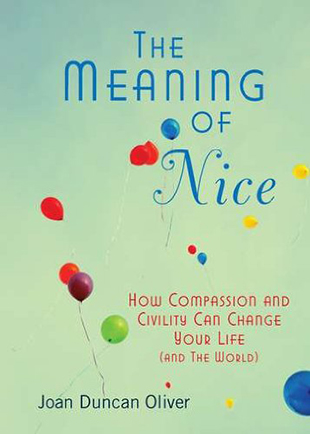It's probably fair to say that most people are turned off by rudeness, selfishness, and greed. But in the cold-hearted scramble for success and perks, many justify their bad behavior in the marketplace as what's needed in a dog-eat-dog world. At the same time, those who feel more optimistic about human nature point to the upturn in volunteerism and the high that comes from helping others.
Joan Duncan Oliver is an award-winning magazine journalist, the author of four books, and the editor of an anthology. In this cogent tour though the complex world of nice, she draws on a variety of disciplines including philosophy and positive psychology.
Beginning with a witty assessment of the different meanings of nice down through the centuries to the present-day cliche of "Have a Nice Day," Oliver lands on a suitable conclusion: "The new nice is an estimable quality, a cloak of kindness to wrap around ourselves in a cold, cruel world. Something good to be — and good to be around."
Underneath the expression of niceness are the insights of writers and researchers in emotional and social intelligence. They have discovered that a nice person is kind, generous, compassionate, and caring. In addition, hopeful people who energize us with their vision and enthusiasm. Nelson Mandela is a shining example of this kind of person.
In a chapter titled "Why Manners Matter," Oliver refers to the seven magic words which are the essence of this practice: "Please. Thank you. Excuse me. I'm sorry." Whereas manners were center stage in the eighteenth century among the French aristocrats, it is a peripheral activity in today's society. Oliver notes: "Manners are a kind of diplomacy, a way of navigating through the endless loops and loopholes of our polyform, multicultural modern life."
We were glad to see the author's inclusion of the Sufi practice of adab in her discussion of manners. She makes reference to our Spirituality & Practice interview with Andrew Harvey on this "beautiful, courteous, refined conduct."
In order to regain its rightful place of honor in our daily lives, niceness needs to come alive in our intimate relationships, at work, and as a counterforce to the excesses of social media. In the last chapter, Oliver writes about the important role respect and inclusion play in the resurrection of niceness in our time. Or as she puts it: "The nicest people are simply those who haven't forgotten our essential kinship as human beings."
